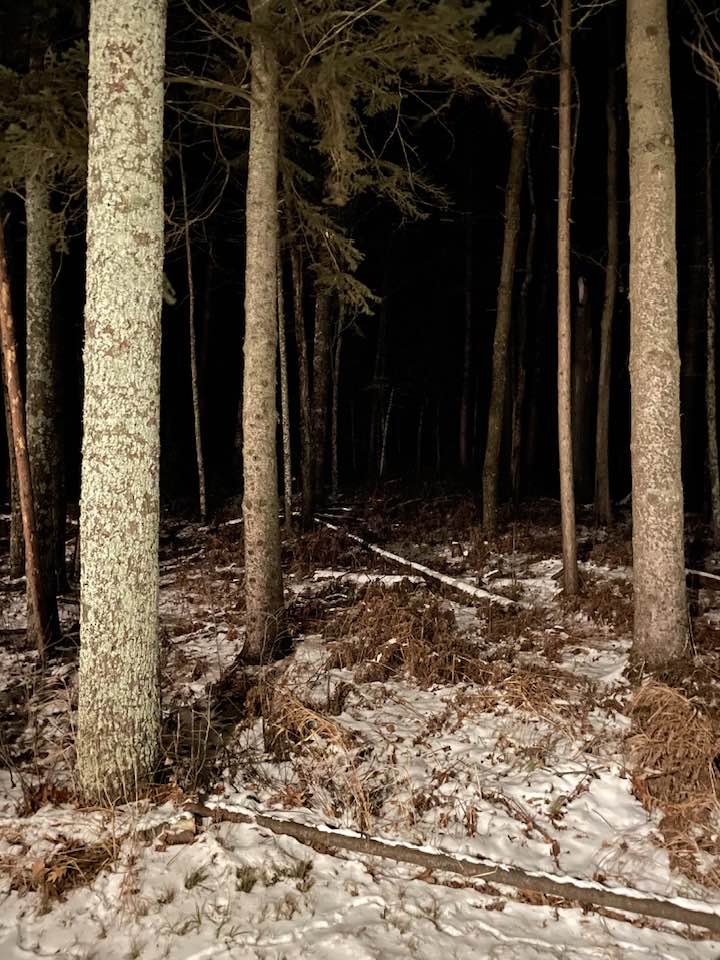DECEMBER 25, 2024 – Before the end of Christmas and the beginning of Hanukkah, we packed the car, mostly with food, and headed up to the Red Cabin for a few days in the north woods. It was my first trip up here since the last of the autumn foliage had fallen. Now the land is laid bare, its detritus and undulations revealed like a person standing naked over clothes scattered across the floor, both soul and skin once hidden now exposed. Thus far only a ragged covering of snow lies about in shambles from above-freezing temperatures. Under thick overcast skies and gloomy atmosphere, the land looks gray and impoverished, deprived of the quiet security of a white down blanket.
As Beth alternated between scrolling and snoozing, I pressed our vehicle onward past the small farms, rolling woodlands and unnamed ponds and lakes scattered among the lakes with names—Deer Lake, Beaver Dam Lake, Shell Lake, Spring Lake, Stone Lake, Sand Lake. In other seasons, many things that by hardwoods are completely protected from sight—roads, barns, houses, outbuildings, and lots of junked vehicles and other equipment—now come into full view. As we raced by, I wondered what a day in the life might be for the people living in these backwoods, now “frontwoods,” places.
Yet I was also impressed by vast uninhabited acreage that seemed untouched by boot or plow; distant horizons obscured by woods that border the highway were now prominent in the absence of oak, birch, maple and poplar foliage. Those far off lands stretched more than my vision. They tugged at my thoughts, as well, as I pondered what awaits the world as it approaches the new year.
Some miles due east of Spooner[1] the late afternoon sun forced its way through layers of overcast. By the time we pulled up to the Red Cabin, ol’ Sol had won the day. But the day was nearly over. By the time the contents inside our vehicle had been transferred to the inside of our cabin, the sun had just dipped upon the western shoreline.
In the remaining light I hiked along the lakeshore path to the east end of Björnholm. Except for animal tracks in the thin snow, I neither saw nor heard any signs of life—wild or human. Our lake never has many ice-fishing houses and the regional snowmobile trail crosses south on Grindstone much farther east beyond the end of our property. Yet, in good years, one often hears in the distance the faint growl of a group of “power sleds” or sees the black specks fly along the distant south shore. Not today. All was quiet on all fronts.
Dusk was descending by the time I reversed direction.
On the return I hiked through the tree garden to see if last month’s high winds had blown the bud caps off many of the white pine seedlings and younger saplings. I was relieved to see that my work had held.
From an elevated vantage point I surveyed the contours of the tree garden. With the land in quiet repose, I was left to wonder what will become of this preserve. Will I be able to save it from the blade, the ax, the dozer unleashed by a future developer’s business plan? That is my mission. Before moving on, I made a promise to the land, this land and its trees; this place that in this season lays bare its features and its soul. I promised that I would do all that I can to protect it—spring, summer, fall and winter.
When I resumed my walk toward the Red Cabin, I was startled by the yard light I’d left on. At other times of the year, that light isn’t visible at night until you’re within less than a hundred feet of the cabin. Now, however, once you clear the top of “Blueberry Hill,” the light can be seen nearly two hundred yards away.
Upon reaching the back of the cabin, I loaded my arms with firewood before stepping inside. After dinner and Scrabble, I’d sit by the fire and scour catalogs for spring planting. Tomorrow I’ll return to the tree garden, laid bare by winter, to scout locations for the seedlings to be ordered.
Subscribe to this blog and receive notifications of new posts by email.
© 2024 by Eric Nilsson
[1] A town barely holding steady at 2,468 souls. It’s named after John Spooner (1843 – 1919), who was a Civil War veteran and railroad lawyer who represented Wisconsin in the U.S. Senate from 1885 to 1891 and again from 1897 to 1907. He was an anti-Progressive; the nemesis of Robert LaFollette, Sr. After retiring from politics, Spooner settled into a corporate law practice in New York City. I wonder how many residents of Spooner today—let alone all the “lake people” of our region who pass through Spooner—know any of that.
